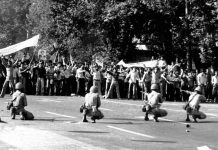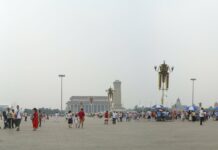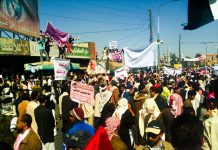
Links til fakta, sites, artikler (dansk + in English) om oprøret i Egypten 2011 og baggrund (bl.a. om strejkebevægelsen 2006-08).
Socialistisk Bibliotek, påbegyndt 2011, revideret januar 2021.
Indhold
Se også på Socialistisk Bibliotek
- Linkbox: Det egyptiske præsidentvalg og venstrefløjen.
- Linkbox: Det arabiske forår, om oprørerne i Nordafrika og Mellemøsten foråret 2011. Links til generelle og større fakta-/analytiske artikler om den generelle udvikling i landene.
- Linkbox: Oprøret i Tunesien, om den forudgående og inspirerende folkelige opstand i Tunesien.
- Linkbox: Opstanden i Libyen, om det væbnede oprør mod Gaddafis regime.
- Linkbox: Yemen – Ungdommens revolution
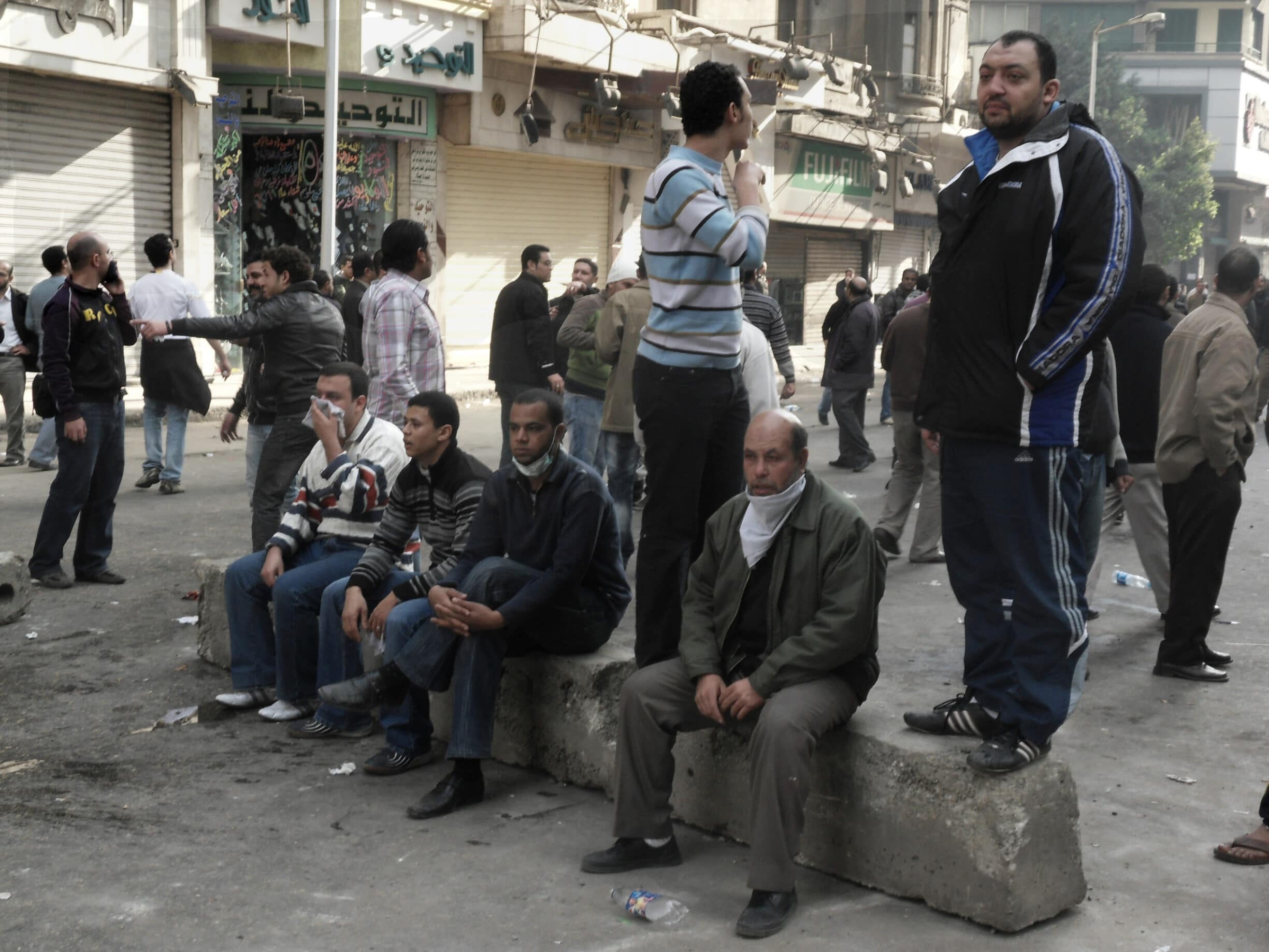
Leksikale
- Egypten (Leksikon.org). Med links til meget statistik.
- Egypten (Wikipedia.dk)
- Oprøret i Egypten i 2011 (Wikipedia.dk)
- 2011 Egyptian revolution (Wikipedia.org). Længere artikel med bl.a. Timeline
- April 6 Youth Movement (Wikipedia.org)
- History of the Muslim Brotherhood in Egypt, 1954–present (Wikipedia.org)
- Timeline of the Egyptian Recolution (Socialist Worker, Issue 2287, 28 January 2012)
Sites
- Democracy Now!: Egypt. “Coverage of the massive demonstrations in Egypt and an archive of our past coverage of issues and topics relevant to Egypt.”
- Egypt Workers’ Solidarity (site; online at Internet Archive). “Providing information about the struggles of the genuine Egyptian workers movement.”
- The Guardian: World News: Egypt
- Hossam el-Hamalawy’s blog: 3arabawy
- In Defence of Marxism: Topic: Egypt
- Informed Comment/Juan Cole: Categories: Egypt
- International Viewpoint: Index: Egypt
- Jadaliyya: Egypt
- Al Jazeera: Egypt special coverager: Revolt on the Nile
- Links: Full coverage: Egypt
- Middle East Research and Information Project: Articles by Subject: Egypt
- Socialist Project: Tag: Egypt
- SocialistWorker.org: Revolution in Egypt
- SocialistWorker.org: Topic: Egypt (2013- )
- World Socialist Web Site: Topic: Egypt

For nyere artikler, se nedenfor: Socialistisk Arbejderavis, In Defence of Marxism, Socialist Worker og World Socialist Web Site.
Danske artikler (+ norsk)
Modkraft.dk
Egyptens venstrefløj går splittet til valg (24. november 2011)
“Massive uenigheder blandt de egyptiske socialister har betydet, at det ikke bliver muligt at opstille en fælles liste til landets første parlamentsvalg efter Hosni Mubaracks fald. Modkraft bringer her et interview med partilederen fra et af landets mange røde partier.”
Modkraft i Egypten (23. februar 2011- )
“Modkrafts reporter Charlotte Lund skriver fra Cairo, Egypten.”
Egypten på kogepunktet. Af Lee Sustar (Kontradoxa, 4. februar 2011)
“Det er arbejderbevægelsen og nye, unge aktivister, der er drivende i massemobiliseringerne i Egypten, mener Ahmed Shawki og Mostafa Oma, amerikansk-egyptiske aktivister.”
Ægypten: Demonstranter danser på kampvogne. Af Osama Hamza (31. januar 2011)
“Tahrir pladsen i Kairo vrimler med demonstranter i alle aldre. De er tilstede døgnet rundt, og en følelse af historisk forandring breder sig i Ægypten. Men der er usikkerhed om hærens indstilling til urolighederne.”
Om Ægyptens politiske økonomi. Af Anders Lundkvist (Kritik og Kaos, 30. januar 2011)
“Det aktuelle oprør i Mellemøsten er blevet sammenlignet med Murens Fald i 1989, hvor Sovjet mistede sine vasaller i Østeuropa. I dag er diktaturerne i de arabiske lande, som USA gennem årtier har holdt ved magten gennem massiv økonomisk, militær og politisk støtte, tilsvarende i fare for at falde.”
Ægypten: Betjente flygter fra flere politistationer. Af Osama Hamza og Ole Wugge Christiansen (28. januar 2011)
“Massedemonstrationer i Ægypten er kulmineret fredag efter fredagsbønnen. Flere byer, blandt andet Suez, rapporteres ude af politiets kontrol. Ifølge tv-stationen Al Jazeera er betjente flygtet fra flere politistationer. Militæret har muligvis skiftet side – og støtter den demokratiske opposition.”
Autonom Infoservice
Ægyptens kvinder gør oprør (13. februar 2011)
“Den gamle ‘Farao’ er trådt tilbage. Forvist af en folkeopstand på gaden, hvor kvinderne var med hele vejen. Dette har indledt en eksplosiv forandring af de traditionelle kønsroller og har rokket ved det herskende kvindesyn. Kvinderne har fået luft under vingerne.”
Mubarak-regimets krig mod befolkningen (5. februar 2011)
“Efter de kæmpestore massedemonstrationer er den politiske generalstrejke for at vælte Mubarak-regimet et vigtigt skridt fra gadens revolte til en veritabel revolution.”
Forskning.no
Fra streik til revolusjon. Av Lorenz Khazaleh (16. september 2011; online på Lorenzk.com)
“Arbeiderbevegelsens langvarige kamp for demokrati i Egypt blir fortsatt ignorert i Vesten, påpeker egyptisk forsker.”
Information.dk
Myten om den islamistiske vinter. Af Olivier Roy (4. januar 2013)
“Egypten og Tunesien er ikke ved synke ned i kaos og fundamentalisme – de er blot i gang med at lære sig selv at blive demokratier.”
Mellemøsten er trådt ind i de post-islamiske revolutioners tid. Af Olivier Roy (18. februar 2011)
“Vestens vanetænkning har med opstandene i Nordafrika for alvor vist sig som forældet: Den arabisk-muslimske verden er ikke længere en undtagelse fra den verdenshistoriske hovedstrøm.”
Vredens revolution i Egypten har momentum. Af Michael Irving Jensen (27. januar 2011)
“Mod al forventning er der udsigt til en helt ny situation i Egypten. Sker det ikke nu, er det kun et spørgsmål om tid, før forandringen kommer.”
Se også tema: Egypten.
Kritisk Debat
Egypten: Stadig på kanten af kløften. Af Poyâ Pâkzâd (15. august 2011; online på DBC Webarkiv)
“På trods af euforien over Mubaraks afgang, venter der de egyptiske arbejdere en usikker fremtid, nye udfordringer og en fortsat kamp hinsides valget til september.”
Farvel fredag? Af Redaktionen (15. februar 2011)
“Et regime kan knægte eller udmatte en fredelig opstand, men det kan i længden ikke holde stand over for en bred strejkebevægelse med deltagelse af store dele af arbejderklassen og middelklassen. Det var også disse strejker, der bevirkede, at opstanden bredte sig fra Kairo, Alexandria og Suez til hele området i det sydlige Egypten og dermed fik national karakter.”
Marxisme Online
Den egyptiske revolution: En politisk analyse og øjenvidneberetning. Af Sameh Naguib (2012, 52 sider)
“Den egyptiske revolution, der begyndte 25. januar 2011 og væltede Mubarak på 18 dage, er langt den vigtigste af de arabiske revolutioner. Egypten er ikke blot det mest folkerige af de arabiske lande, landet har også den største, mest militante og erfarne arbejderklasse i regionen.”
Le Monde Diplomatique (Nordisk utgave)
Revolusjonen fortsetter i Suez. Av Francois Pradal (nr.1, januar 2012)
“I byen med lang historie for motstand kjemper nå revolusjonære og fagforeninger for å holde liv i den sosiale kampen som startet her for et år siden. I valgkampen er personer viktigere enn partier for en befolkning som på én og samme tid er revolusjonær, konservativ og religiøs.”
Revolusjonens Egypt. Av Alain Gresh (nr.7, juli 2011)
“Revolusjonen som ble innledet med styrting av Mubarak har bare så vidt begynt. Overalt i gatene, på fabrikkene og kafeene uttrykker egypterne sine ønsker om frihet og reelle endringer, et samfunn der de fattige ikke lenger ignoreres.”
Brorskapets ‘ryddige overgang’. Av Gilbert Achcar (nr.3, mars 2011)
“I slutten av februar bestemte Det muslimske brorskapet seg for å dannet Partiet for frihet og rettferdighet. Dermed har de fått en politiske gren som kan få stor innflytelse på Egypts politikk, men ikke nødvendigvis i islamistisk retning.”
‘Revolusjonen har bare så vidt begynt’. Av Raphael Kempf (nr.3, mars 2011)
“Middelklassen kjempet for politiske rettigheter, mens arbeiderne ser på de politiske rettighetene som et mål til å nå sine sosiale og økonomiske krav. ‘facebook-generationen’ og streikende arbeidere bidra sammen til å felle Mubarak, men den største utfordringen ligger foran dem, nemlig å bygge et politisk så vel som økonomisk rettferdigt samfunn.”
Hybridiseringen i Egypt. Av Sarah Ben Néfissa (nr.2, februar 2011)
“Protestbevegelsen i Egypt har vokst jevnt siden 2005, på tross av undertrykkingen. Dette har overrasket hele den politiske klassen, inkludert Det muslimske brorskapet.”
Revolution
Egypten: ny fase i revolutionen. Af Hamid Alizadeh (23. november 2011)
“Mens disse linjer bliver skrevet står revolutionen og kontrarevolutionen overfor hinanden i Egyptens gader. Tahrir pladsen i Kairo er igen blevet revolutionens brændpunkt.”
Mubarak er faldet – revolution indtil sejr! Af Alan Woods (14. februar 2011)
“Det afgørende element i den revolutionære ligning, der endelig tvang Mubarak ud, var arbejderklassens intervention … De sidste dage er arbejdere og fagforeninger gået med i protesterne over hele landet. Strejker over hele landet gav et nyt og uimodståeligt momentum til massedemonstrationerne i Kairo og andre byer.”
Kampen om Tahrir Square]. Af Alan Woods (6. februar 2011)
“Der var intet spontant omkring dette voldsomme og blodige sammenstød. Det var yderst organiseret og planlagt. Det var et sidste desperat forsøg på at forsvare Mubaraks diktatur.”
Egypten på randen af borgerkrig. Af Alan Woods (3. februar 2011)
“Revolutionen i Egypten er på et kritisk stadie. Den gamle statsmagt kollapser under massernes slag. Men revolution er en kamp mellem levende kræfter. Det gamle regime har ikke tænkt sig at overgive sig uden kamp.”
Rødt!/Gnist
Den arabiske våren og den ufullført revolusjonen. Av Hanna Kjemprud (nr.3, 2016, s.133-136). Anmeldelse af Joel Beinin: Workers and thieves: Labor movements and popular uprisings in Tunisia and Egypt (Stanford University Press, 2016, 164 p.) + Philip Marfleet: Egypt: Contested revolution (Pluto Press, 2016, 251 p.). “Det er derfor all grunn til å ønske velkommen disse to bøkene som gir oss bedre innsikt i hvordan det hele har utviklet seg, og legger stor vekt på dem som har kjempet for forandring, spesielt fagbevegelsen.”
Socialistisk Arbejderavis
10 år efter den egyptiske revolution – hvad har vi lært? Af Asbjørn Valhøj (nr. 384, januar 2021)
“Det egyptiske eksempel viser vigtigheden af en revolutionær strategi, der er international, socialistisk, og som led i sin strategi søger at gøre sig uafhængig af det eksisterende statsapparat.”
Tema: Sejr til den egyptiske revolution (nr.306, 10. februar 2011)
Med en række artikler online, se bl.a.:
Oprør har ligget i luften. Interview med Hossam el-Hamalawy.
“Hossam el-Hamalawy er en egyptisk journalist og aktivist, som blogger på websitet 3arabawy. Han har længe skrevet om krisen i Mubaraks regime, der er kulmineret i masse-oprøret i år.”
Se også Tema: Egypten (Socialister.dk). Aktuelt + tidligere artikler på dansk og engelsk.
Socialistisk Information
Venstrefløjen foran en magtkamp. Af Sholeh Irani (28. august 2011)
“‘Let’s fight like an Egyptian’, er blevet et slagord verden over. Mens den egyptiske revolution og dens metoder påskønnes som et ægte forbillede i mange andre lande, både i Mellemøsten og Europa, fortsætter kampen om den politiske magt i Egypten.”
Fem egyptiske partier danner venstrefront. Af Dina Samak (16. maj 2011)
“Begrebet ‘socialisme’ blev i mange år mødt med udbredt skepsis i Egypten … nu eksisterer Nassers arabiske socialisme ikke længere, og tilhængerne af socialismen, styrket af den igangværende revolution, forsøger at komme tilbage på den politiske scene.”
Håb og forandringer i den arabiske verden (11. marts 2011)
“I dette interview diskuterer den libanesiske forfatter, socialist og antikrigs-aktivist Gilbert Achcar betydningen af den nuværende bølge af masseprotester i Mellemøsten.”
Strejker ruller over Egypten (18. februar 2011)
“Mostafa Omar rapporterer fra Egypten om, hvordan arbejdernes oprør vil påvirke de næste kampe. Strejker og arbejderkampe fortsætter over hele Egypten og udfordrer dermed de militærchefer, som har overtaget magten efter Hosni Mubarak for at stoppe revolutionen fra at udvikle sig videre.”
Egypten på kogepunktet (1. februar 2011)
“Redaktøren af International Socialist Review (USA), Ahmed Shawki , vendte for nylig vendt hjem fra Kairo. Sammen med den egyptisk-amerikanske aktivist Mostafa Omar snakkede han med Lee Sustar om betydningen af protesterne og om de sociale og politiske kræfter, der gav anledning til dem.”
Solidaritet
Jetfly over Tahrir-pladsen. Af Hicham Safieddine (nr.1, februar 2011). P.t. ikke online.
“Den revolutionære glød, der blev tændt med Mohammed Bouzizis selvmord i Tunesien i slutningen af december, er nu blevet til en regulær ildebrand af folkelige opstande over alt i den arabiske verden og bliver for hovedparten ført an af arbejdere, studenter og arbejdsløse (mænd som kvinder).”
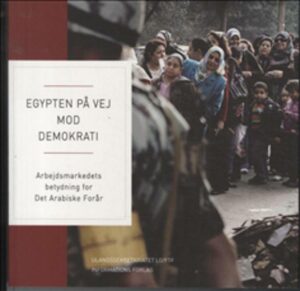
Bøger på dansk
Egypten på vej mod demokrati: Arbejdsmarkedets betydning for Det Arabiske Forår. Red. af Helle Schøler Kjær (Ulandssekretariatet LO/FTF & Informations Forlag, 2012, 213 sider). Med bidrag af Christian Friis Bach, Pernille Bramming, Lasse Ellegaard, Eva Plesner mfl. Se bogens forord (Ulandssekretatiatet, 12. april 2012) + anmeldelse af Line Scheibel Mitchell: Egyptens forår begyndte hos tekstilarbejderne (Ulandsnyt.dk, 4. maj 2012).
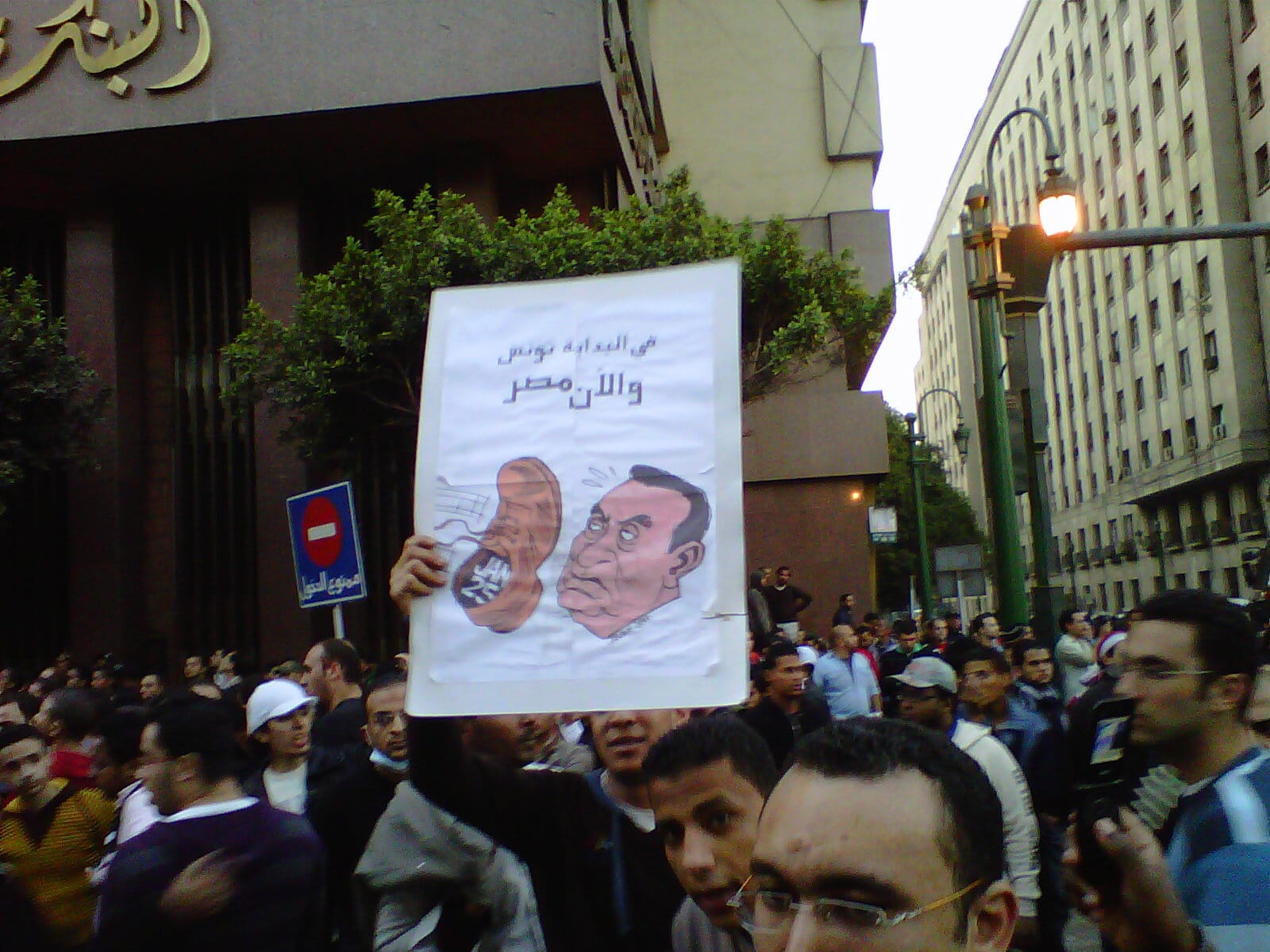
Articles in English
Against the Current
Revolution and counterrevolution. By Joel Beinin (Issue 231, July-August 2024). Review of Atef Shahat Said, Revolution Squared: Tahrir, Political Possibilities, and Counterrevolution in Egypt (Duke University Press, 2024, 360 p.)
“The insights that Atef Shahat Said gained into Egypt’s politics of protest and mobilization — through his work and political activities before he embarked on an academic career — deeply enrich Revolution Squared, a participant-observer account of what is widely called Egypt’s January 25, 2011 revolution.”
Arab Spring: Against shallow optimism and pessimism. By Atef Said (Issue 187, March-April 2017). Review of Joel Beinin, Workers and Thieves: Labor Movements and Popular Uprisings in Tunisia and Egypt (Stanford University Press, 2015, 176 p.)
“Beinin offers an excellent historical overview of trade unions and workers’ struggle in Egypt and Tunisia, long before the Arab Spring uprisings as well as in their aftermath.”
Egypt’s Revolution at three. By Noha Radwan (Issue 169, March-April 2014)
“One important revolutionary activity that has been instrumental in Egypt’s revolutionary struggle and remains active today is the workers’ movement … Not surprisingly, reports on this movement have been scarce and corrupted in the Egyptian media and absent from the Western media.”
Roads to the Arab Uprisings. By Kit Adam Wainer (Issue 167, November-December 2013). Review of Jeanine Sowers and Chris Toensing (eds.), The Journey to Tahrir: Revolution, Protest, and Social Change in Egypt (Verso, 2012, 320 p.) + David McMurray and Amanda Ufheil-Somers (eds.), The Arab Revolts: Dispatches on Militant Democracy in the Middle East (Indiana University Press, 2013, 272 p.)
“Egypt, the font of modern Arab nationalism and political Islam, is the subject of The Journey to Tahrir. Sowers and Toensing have collected a strong group of essays on the political, cultural and historical backgrounds of the Egyptian revolt of 2011. The Arab Revolts is a regional collection allowing readers to compare the evolution of protest movements in five Arab countries.”
Egypt’s year of revolution: an interview with Carl Finamore (Issue 158, May-June 2012)
“Carl Finamore went on a reporting trip to Egypt for ten days in 2011. He arrived on February 11, 2011, the day President Hosni Mubarak was deposed. He visited for another ten days in 2012, on the one-year anniversary of the 18-day revolt that began on January 25, 2011. On both occasions, he travelled to Egypt with letters of introduction from his union and the San Francisco Labor Council.”
Egypt’s unfinished revolution (Issue 156, January-February 2012)
“Atef Said is a Ph.D candidate in sociology at the University of Michigan-Ann Arbor. A human rights lawyer and a political activist in Egypt before moving to the United States in 2004, he is the author of two books (in Arabic) on torture under Mubarak. Said was interviewed on December 2 by David Finkel for the editors of Against the Current.”
Why the revolt in Egypt? By Dan La Botz (Issue 152, May-June 2011). Review of Egypt: The Moment of Change, edited by Rabab El-Mahdi and Philip Marfleet (Zed Press, 2009)
“Written a year before the fact, their book virtually predicts the coming upheaval which is now history. The pithy introduction alone provides by far the best short account of pre-revolutionary Egypt, of Egypt in a pre-revolutionary period.”
Egypt and beyond: an interview with Gilbert Achcar (Issue 151, March-April 2011)
“Gilbert Achcar, who grew up in Lebanon, is professor of development studies and international relations at the School of Oriental and African Studies (SOAS), London, and author most recently of The Arabs and the Holocaust: the Arab-Israeli War of Narratives. Farooq Sulehria interviewed him on February 4.”
Women, revolution and the future (Issue 151, March-April 2011)
“Valentine Moghadam is director of the Women’s Studies Program and a professor of sociology at Purdue University. She responded to some questions from Against the Current early on February 11, 2011, shortly before the announcement of Hosni Mubarak’s resignation.”
Al Jazeera
Interview with Hossam el-Hamalawy (27 January 2011)
“An Egyptian journalist and left-wing activist/blogger [3arabawy.org] explains why the uprising against the Mubarak regime is far from a surprise.”
See also Special coverager: Revolt on the Nile.
Anarkismo.net
The Arab world is on fire: dialogue with a Syrian anarchist (January 31, 2011)
“We have had a quick dialogue with our comrade and friend Mazen Kamalmaz in Syria, editor of an Arabic anarchist blog, who talks about the importance of this splendid political development.”
Catalyst Review
Why did the Egyptian Revolution fail? By Hossam El-Hamalawy (25 May 2023). Review of Hesham Sallem’s book (Colombia University Press, 2023, 472 p.)
“Class Politics traces the historical roots of Egypt’s current revolutionary closure. It examines why the 2011 mass revolt found a Left in deep political crisis and the Muslim Brotherhood ascendant.”
Class dynamics explain the Egyptian Revolution. By Nada Matta (25 April 2023). Review of Mona El-Ghobashy’s book (Stanford University Press, 2021, 392 p.)
“Egypt’s Revolutionary Situation is a riveting account of the 2011 Egyptian Revolution. But it ignores class and capitalism and fails to explain the reasons behind Egypt’s mass mobilization and why it was defeated.”
Counterfire.org
No way to remember anything. By Kevin Crane (September 8, 2016). Review of Samir Amin, The Reawakening of the Arab World: Challenge and Change in the Aftermath of the Arab Spring (Monthly Review Press, 2016, 240 p.)
“An analysis of the 2011 Egyptian revolution reproduces the same mistakes on the left that led to the revolution’s defeat in 2013.”
The midnight hour of the Egyptian revolution. By John Rees (25 January 2014)
“Three years after the overthrow of Mubarak the counter-revolution is gaining ground.”
Egypt 2011: what sort of revolution is this? By Neil Faulkner (15 February 2011)
“There are several reasons for doubting that Egypt 2011 will prove to be an Arab version of either the Iranian revolution of 1979 or the East European velvet revolutions of 1989.”
The Egyptian revolution is a step away: John Rees reports from Cairo (31 January 2011)
“The revolution is still moving forward. The army’s press statement this evening that they respect the peoples’ right to protest and that they will not open fire on peaceful protesters is an unmistakable message that it is safe to demonstrate in huge numbers tomorrow.”
CounterPunch
Egypt’s revolution is only beginning. By Alain Gresh (July 6, 2011)
“Perhaps the workers are the real heroes. In the Cairo offices of the daily Al-Tahrir, Mustafa Bassiouni, an expert on union and workers’ affairs, asked: ‘Why is it that the uprisings in Libya, Yemen and Bahrain have not yet succeeded?’
Suleiman and the Muslim Brotherhood. By Ron Jacobs (February 8, 2011)
“It is not my intention here to portray the Muslim Brotherhood as something that it isn’t. It is my intention, however, to explain it as an organization that defies the simplistic utterings of some US officials and legislators as merely another jihadist bunch of terrorists intent on destroying freedom.”
The Muslim Brotherhood and democracy in Egypt. By John L. Esposito (February 7, 2011)
“The Brotherhood did not initiate nor led the pro-democracy protest … While the Brotherhood will no doubt continue to have an influential role, in a new more open and pluralistic political climate, they will be one of many potential political players and parties.”
Democracy Now!
Video (+ text): The Egyptian Revolution (February 11, 2011, 75 min.)
“As news of Hosni Mubarak’s resignation breaks, Democracy Now! broadcasts live reaction from Tahrir Square and beyond with senior producer Sharif Abdel Kouddous and correspondent Anjali Kamat.”
Video (+ text): Uprising in Egypt (February 5, 2011)
“A two-hour special on the revolt against the U.S.-backed Mubarak regime.”
Video (+ text): ‘This is the most remarkable regional uprising I can remember’ (February 2, 2011, 13 min.)
“We speak to MIT Professor Noam Chomsky about what this means for the future of the Middle East and U.S. foreign policy in the region.”
See also Topics: Egypt.
Foreign Policy
What have workers gained from Egypt’s revolution? By Joel Beinin (July 20, 2011)
“The lives of Egyptian working people are still cheap in the eyes of a great many policemen, government officials, and managers of firms in both the private and public sectors. What has changed, and this is the most important gain of the revolutionary movement, is that workers no longer accept this.”
In Defence of Marxism
Egypt: Morsi dead – the end of one class enemy at the hands of another. By Dejan Kukic and Hamid Alizadeh (20 June 2019)
“Morsi’s death shines a spotlight once again on the events of the Egyptian Revolution, the role of the Muslim Brotherhood and the current practices of President Sisi’s repressive state apparatus.”
One year on: the Egyptian revolution continues. By Brian Adams (9 February 2012)
“Despite all that has happened over the past 12 months, nothing has fundamentally changed for the majority of ordinary Egyptians. There have been a series of victories and defeats for the workers and youth of Egypt, but now, with the anniversary of the Revolution, the movement is entering a new phase.”
Egyptian working class organising and on the move: ‘a revolution within the revolution’. By Brian Adams (29 September 2011)
“The euphoria amongst the Egyptian masses that followed the fall of Mubarak in February has disappeared. The hard reality of the situation – in which political, social, and economic conditions have barely changed – has set in. The revolution has not ended, however, but has, after a brief lull, transitioned from the streets to the workplaces.”
Egypt: the class war intensifies. By Frank Andersen (29 September 2011)
“With the re-introduction of the emergency law, the military junta is desperately trying to strangle the revolution and return to the ‘normality’ of the Mubarak era. But the workers are on the move. The recent upsurge in strikes and protests could spell the end for the SCAF regime.”
Mubarak has fallen! – revolution until victory! By Alan Woods (11 February 2011)
“This is the result of the marvellous movement of the masses, which has faced the guns and batons of the police and courageously resisted every attack by the forces of reaction. It is the culmination of two weeks of revolutionary struggle that has been an inspiration to us all.”
Egyptian workers take the lead. By Alan Woods (9 February 2011)
“There are situations in which mass demonstrations are sufficient to bring about the fall of a regime. But Egypt is not one of them. All the efforts of the masses to bring about the overthrow of Mubarak through demonstrations and street protests have so far failed to achieve their principal objective.”
Egyptian revolution reverberates throughout Arab world. By Fred Weston (7 February 2011)
“The Egyptian revolution, following on rapidly from the Tunisian uprising, has sent shockwaves across the whole of the Arab world. All the serious strategists of capital are discussing the “domino effect” of the events unfolding in Egypt. None of them, however, had anticipated any of this.”
Egypt: the moment of truth. By Alan Woods (1 February 2011)
“The difference between Hosni Mubarak’s regime and the Pyramid of Khufu is that it is an inverted pyramid. All its strength is at the top, but there is only a tiny point at the bottom. The laws of gravity and architecture tell us that such a structure is inherently unstable. The slightest push can bring the whole structure crashing down.”
See also Categories: Egypt.
Independent
Blood and fear in Cairo’s streets as Mubarak’s men crack down on protests. By Robert Fisk (3 February 2011)
“‘President’ Hosni Mubarak’s counter-revolution smashed into his opponents yesterday in a barrage of stones, cudgels, iron bars and clubs, an all-day battle in the very centre of the capital he claims to rule between tens of thousands of young men, both – and here lies the most dangerous of all weapons – brandishing in each other’s faces the banner of Egypt.”
See more Cairo-reports Cairo from Robert Fisk.
Informed Comment/Juan Cole
Egypt’s class conflict. By Juan Cole (1/30/2011)
“The Nasserist state, for all its flaws, gained legitimacy because it was seen as a state for the mass of Egyptians, whether abroad or domestically. The present regime is widely seen in Egypt as a state for the others – for the US, Israel, France and the UK – and as a state for the few – the Neoliberal nouveau riche.”
See also Categories: Egypt.
Insurgent Notes
Egypt: Historical compromise over an attempt at democratic change: what happened in 2011 (pdf). By Mouvement Communiste (Issue 4, August 2011, 66. p.)
“What is sure is that in all Arab countries and Egypt too, people are not struggling for Communism … but for Democracy. And what we have to explain is what this Democracy and all the democratic demands mean by examining deeply what is going on in these countries even under the umbrella of a still powerful army.”
International Socialist Group
Feminism, muslim women and the Egyptian revolution (March 26, 2012; online at Counterfire)
“Women led the Egyptian revolution, but the Western media have a fundamental misunderstanding of the process at play in Arab society, argue Pete Ramand and Mahmoud Mahdy.”
International Socialism
“This infuriates the masses”: how Palestine and economic chaos fuel rage against Egypt’s dictatorship (Issue 183, Summer 2024). “International Socialism spoke to three revolutionary activists in Cairo—Mohamed, Musa and Laila—about Egypt today. They discussed the regime, workers and the prospects for the left.”
Neoliberalism, the state and revolution: the case of Egypt. By Philip Marfleet (Issue 155, Summer 2017, p.127-152). “This article addresses the crisis of the left in Egypt at a time of repression, and as an example of the problems and possibilities associated with a challenge to capitalism in the era of neoliberalism.”
Egypt: In the heart of the struggle. By Philip Marfleet (Issue 152, Autumn 2016). Review of Maha Abdelrahman, Egypt’s Long Revolution: Protest Movements and Uprisings (Routledge, 2015, 170 p.)
“[The book] is an important assessment of the revolutionary process by an acute and supportive observer of struggles for change.”
Egypt: after the coup. By Philip Marfleet (Issue 142, Spring 2014)
“The military coup of July 2013 was a serious setback for the revolutionary movement in Egypt … The revolution has not been crushed, however.”
Egypt: The workers advance. By Philip Marfleet (Issue 139, Summer 2013)
“This article looks at the changing locus of struggle and the increasing confidence of Egyptian workers who, during 2013, have reasserted their potential as a force for further change.”
‘Never going back’: Egypt’s continuing revolution (Issue 137, Winter 2013, p.35-71)
“Phil Marfleet analyses the situation in Egypt, rejecting the claims that the Arab spring has been replaced by an ‘Islamist winter’ and demonstrating that, as the scenes on the streets show, the Revolution is far from over.”
The Egyptian workers’ movement and the 25 January Revolution. By Anne Alexander (Issue 133, Winter 2012, p.101-125)
“In contrast to the perspective provided by the mainstream media, which sees the Egyptian Revolution as a series of inexplicable ‘clashes’ and explosions of random violence, the article lays out how the development of the class struggle over the ten months between February and November has changed the Egyptian workers’ movement, and in the process changed the revolution itself.”
The growing social soul of Egypt’s democratic revolution. By Anne Alexander (Issue 131, Summer 2011, p.77-104)
“This article is a preliminary and incomplete account of an unfinished revolution. It represents a first attempt to explore the implications of the great wave of strikes and social protests which preceded Mubarak’s fall from power and dominated the first months of the revolution.”
The return of the Arab revolution. By Alex Callinicos (Issue 130, Spring 2011, p.3-32)
“The Arab revolutions are rewriting the political map of the Middle East and renewing the very idea of revolution itself. This analysis seeks to situate the revolutions in in the context of the global economic crisis.”
Act one of the Egyptian revolution. By Philip Marfleet (Issue 130, Spring 2011, p.57-74)
“Philip Marfleet traces the sources of the 25 January Revolution in Egypt to the corruption of the Mubarak regime.”
International Socialist Review
Year one of the Egyptian Revolution (Issue 82, March-April 2012)
“Mostafa Ali, a member of Egypt’s Revolutionary Socialists and journalist for Ahram Online, talked about the first year of Egypt’s revolution – and what comes next.”
The new shape of the struggle in Egypt (Issue 78, July-August 2011)
“Mostafa Omar reports on a breakthrough for the left after months of religious strife and anti-strike propaganda.”
Egypt’s ‘orderly transition’? By Adam Hanieh (Issue 78, July-August 2011)
“This article argues that [the Western] financial packages needs to be seen as much more than just a further illustration of Western hypocrisy. The plethora of aid and investment initiatives advanced by the leading powers in recent days represents a conscious attempt to consolidate and reinforce the power of Egypt’s dominant class in the face of the ongoing popular mobilizations.”
Egypt’s unfinished revolution. By Mostafa Omar (Issue 77, May-June 2011)
“Millions of young people led the uprising in Egypt with great resolve and determination, yet what happened in Egypt was much bigger and much deeper than just a youth revolution or a Facebook revolt. It is probably fair to say that this revolutionary uprising and process underway in Egypt is one of the greatest popular revolutions in modern history.”
Chronicle of a revolution. By Ahmed Shawki and Mostafa Omar (Issue 76, March-April 2011)
“A running account of the days of mass protest that brought down Egypt’s Hosni Mubarak in February 2011, by two eyewitnesses, each of whom spent several days in Cairo during the revolution.”
The roots of Egypt’s revolt. By Hadas Thier (Issue 77, May-June 2011). Review of Rabab El-Mahdi and Philip Marfleet, eds., Egypt: The Moment of Change (Zed Books, 2009) “Though Egypt: The Moment of Change was published more than a year in advance of the revolution in Egypt, it provides indispensible analysis for understanding the roots of the revolution.”
International Viewpoint
The current situation in Egypt (Issue 474, July 2014)
“This selection of articles covers the current situation in Egyt and the situation of the left current Revolutionary Socialists.”
Muslim Brotherhood coup and popular reaction. By Chedid Khairy (Issue 456, January 2013)
“The Egyptian revolutionary process is far from over. The current divisions and failures cannot be explained by a confrontation between democrats and Islamists ”” a reading which is too widespread in the mainstream media. The current crisis is not legal but eminently political.”
Independent trade unionism asserts itself. By Chedid Khairy (Issue 435, April 2011)
“In the framework of the revolutionary process that Egypt has experienced since January 2011, workers and the trade union movement have played a big role. The demand for a trade unionism that defends the interests of the workers has been expressed even more strongly.”
Whither Egypt? Interview with Gilbert Achcar (Issue 433, February 2011)
“To help explain the thrilling developments in Egypt, Farooq Sulehria interviewed leading Arab scholar-activist Gilbert Achcar: One major outcome of the ongoing events is that popular aspirations to democracy have been hugely boosted. They create ideal conditions for the left to rebuild itself as an alternative.”
Irish Marxist Review
Lessons from the Egyptian Revolution (pdf). By John Molyneux (Vol.4, No.13, 2015, p.18-32)
“The Egyptian Revolution of January 25 to February 11 2011 has been the greatest revolutionary struggle of the 21st century to date … Yet the fact is, and this needs to squarely faced, the Egyptian Revolution has been defeated.”
Jacobin: Reason in Revolt
Egypt’s decade of revolution and counterrevolution. By Brecht De Smet (11 February, 2021) “The fall of the Egyptian dictator, Hosni Mubarak, ten years ago today, was a triumph for popular mobilization. But the revolutionary forces lacked the political organization and vision needed to head off a counterrevolutionary backlash that restored the authoritarian state’s power.”
The roots of the Egyptian crisis. By Joel Beinin (9 January 2018). Review of Robert Springborg, Egypt (Polity Press, 2017)
“Egypt’s current crisis highlights the flawed foundations of its post-revolutionary state. But liberal nostalgia for the days of the monarchy is equally misplaced.”
The Egyptian Counterrevolution (11 March 2016). Interview with Sameh Naguib of of Egypt’s Revolutionary Socialists.
“Where is the revolution headed? What role are international powers playing in determining Egypt’s fate? And how should the Left relate to the Muslim Brotherhood?”
Japan Focus
The Egyptian Revolution: first impressions from the field. By Mohammed A. Bamyeh (February 11, 2011)
“This revolution will leave traces deep in the social fabric and psyche for a long time, but in ways that go beyond the youth … over the days I saw an increasing demographic mix in demonstrations, where people from all age groups, social classes, men and women, Muslims and Christians, urban people and peasants.”
John Molyneux blog
Reflections on the Egyptian Revolution (May 20, 2011)
“Paradoxically one of the most surprising features of the Egyptian Revolution has been the very familiarity of many of its episodes and scenarios – at least familiarity to those who have studied the history of revolution and read the classic literature on the subject (Marx, Engels, Lenin, Trotsky, Luxemburg, Gramsci etc).”
Libcom.org
Egypt at the tipping point? By Joel Beinin (February 2, 2011)
“Joel Beinin analyses in detail the current situation in Egypt, with mention of the contributions from the various ‘opposition’ groups as well as the important role of workers’ protest in recent years.”
See also Topics: Egypt unrest.
Links
Egypt’s ‘orderly transition’? International aid and the rush to structural adjustment. By Adam Hanieh (May 29, 2011)
“This article argues, that a critique of these financial packages needs to be seen as much more than just a further illustration of Western hypocrisy. The plethora of aid and investment initiatives advanced by the leading powers in recent days represents a conscious attempt to consolidate and reinforce the power of Egypt’s dominant class in the face of the ongoing popular mobilisations.”
Egyptian Socialist Party: Political perspectives for Egyptian socialism (May 27, 2011)
“The political perspectives document of the newly formed Egyptian Socialist Party – one of a number of new pro-democracy parties formed in Egypt since the January 25, 2011, revolution that overthrew the dictator Hosni Mubarak. The party will be officially inaugurated on June 18, in Cairo.”
Egypt: Historian Joel Beinin on the role of the labour movement (February 4, 2011)
“Professor Beinin, who was the Director of the Middle East Studies Center and Professor of History at the American University in Cairo from 2006 to 2008 and teaches courses on the modern Middle East at Stanford, offers a historical perspective on the current Egyptian uprising.”
See also Full Coverage: Egypt (Links)
Louis Proyect: The Unrepentant Marxist
Reflections on the Egyptian revolution (February 4, 2011)
“A careful study of the unfolding events in Egypt leads to one and only conclusion, namely that the masses prefer to express themselves through massive, peaceful demonstrations. The spectacle of a million anti-Mubarak protesters in Tahrir Square is much more revolutionary than any bold or violent action taken by a small and determined minority.”
Middle East Report
Egypt from icon to tragedy. By Mona El-Ghobashy (Issue 301, Winter 2021). “When masses of people assembled in Egypt’s public squares and succeeded in toppling President Husni Mubarak in 2011, the world went a little bit mad. That an urban uprising unseated one of the contemporary world’s most favored autocrats became freighted with symbolism.”
From the Archive: Egypt (February 17, 2016)
“Five years since the enormous uprising centered in Cairo’s Tahrir Square, we asked some friends and colleagues who have written on Egypt to list their favorite MERIP articles about that country.”
Egypt running on empty. By Joshua Stacher (March 8, 2016)
“The period since the July 2013 coup has been the single most repressive in modern Egyptian history.”
Egyptian Workers after June 30. By Joel Beinin (August 23, 2013)
“The independent labor movement that has flourished in Egypt since the ouster of former president Husni Mubarak enthusiastically supported the Tamarrud (Rebel) campaign for the huge June 30 demonstrations asserting a popular vote of no confidence in President Muhammad Mursi.”
“This is our square”: Fighting sexual assault at Cairo protests. By Vickie Langohr (Issue 268, Fall 2013)
“During the 18 days of protests that forced Husni Mubarak’s resignation, sexual harassment was remarkable because it was rare.”
Workers, trade unions and Egypt’s political future. By Joel Beinin (January 18, 2013)
“Since the uprising against the Mubarak regime, some 1,000 new unions independent of the state-sponsored Egyptian Federation of Trade Unions (ETUF) have sprung up.”
Reflections on two revolutions. By Ahmad Shokr (Issue 265, Winter 2012)
“The absence of a new framework of power, one that yields not just electoral victories but a mobilizing vision that cements the authority of Egypt’s new leaders and neutralizes alternative visions and aspirations, leaves the political field open for many struggles to come.”
Egypt’s Popular Committees: from moments of madness to NGO dilemmas. By Asya El-Meehy (Issue 265, Winter 2012)
“The evolution of popular committees in Egypt to date highlights not just their varied trajectories but also the blurring of boundaries between state and civil society in moments of political transformation.”
Egypt’s generals and transnational capital. By Shana Marshall and Joshua Stacher (Issue 262, Spring 2012)
“Military, Inc. is determined that its holdings and operations remain beyond public scrutiny. The real Machiavellian turn in Egypt is just how many Islamists, liberals, nationalists and unaffiliated actors are content to watch the military’s economic empire grow at the expense of those clamoring for political change and social justice.”
Art in Egypt’s revolutionary square. By Ursula Lindsey (January 2012)
“Nearly one year on, there have been many reversals. But what Egyptians call the January 25 revolution has undoubtedly ushered in a new sense of freedom, as well as a determination to use public space to congregate and to connect, and to demonstrate support for the uprising through cultural activism.”
Sightings of the Egyptian deep state. By Issandr El Amrani (January 1, 2012)
“As the SCAF [Supreme Council of the Armed Forces] inevitably recedes from the scene in 2012 – the election of a new president will oblige it to – it is the hybrid military-civilian deep state and its manipulations that could be the greatest cause for worry.”
Egypt’s Bloody Sunday. By Mariz Tadros (October 13, 2011 )
“The death toll is now at least 25 and counting. Furthermore, the army’s claim to fame during the January-February popular uprising – that it would not, under any circumstances, harm Egyptian civilians – has now been given the definitive lie.”
Striking back at Egyptian workers. By Hesham Sallam (Issue 259, Summer 2011)
“In Egypt, the spirit of Tahrir Square lives, but as Hesham Sallam
shows, elites have rallied to blunt the social justice demands of the
revolution.”
Egypt without Mubarak. By Joshua Stacher (April 7, 2011)
“The popular revolution of January-February in Egypt has thus far produced a structural change in the country’s governing coalition without producing a regime change per se. A great contest is underway to define the center of Egyptian politics – and the outcome is thoroughly uncertain.”
The praxis of the Egyptian revolution. By Mona El-Ghobashy (Issue 258, Spring 2011)
“Mona El-Ghobashy offers a magisterial close reading of the crucial four days – January 25-28 – that transformed a protest into an uprising and then into a revolutionary situation in Egypt. With tactics learned from a decade of clashes with police, ordinary Egyptians overthrew an extraordinarily strong regime.”
Revolution and counter-revolution in the Egyptian media. By Ursula Lindsey (February 15, 2011)
“Access to and use of communication and information networks was pivotal as events unfolded. While the regime used the state information apparatus to unleash propaganda against the protesters, the protesters disseminated their message in ways that were at once disciplined, creative and subversive.”
Red-White-and-Black Valentine. By the Editors (February 14, 2011)
“There are moments in world affairs that call for the suspension of disbelief. At these junctures, caution ought to be suppressed and cynicism forgotten to let joy and wonderment resound. Across the globe, everyone, at least everyone with a heart, knows that the Egyptian revolution of 2011 is such a time.”
Into Egypt’s uncharted territory. By Hesham Sallam, Joshua Stacher and Chris Toensing (February 1, 2011)
“Amidst the monumental Egyptian popular uprising of 2011, Plan A for the Egyptian regime and the Obama administration was for Husni Mubarak to remain president of Egypt indefinitely. They have now moved on to Plan B … to ride out the uprising with their basic authoritarian prerogatives intact.”
Dead-Enders on the Potomac. By the Editors (January 29, 2011)
“As the Tunisian example showed, and as the Egyptian experience may yet drive home, the US will stand by its favored authoritarian Arab states until the bitter end. From the January 28 performance on the Potomac, it is not clear that the US can even imagine an alternative course.”
See also Articles by Subject: Egypt
Le Monde Diplomatique
The Muslim Brothers in Egypt’s ‘orderly transition’. By Gilbert Achcar (March 2011)
“After the revolution, a newly respectable Muslim Brotherhood, supportive of the army, is emerging. Could it become the best bet for the ”˜orderly transition’ that Egypt, and the US, hope for?”
The impossible happened: The Arab wall begins to fall. By Serge Halimi (February 2011)
“Political leaders often claim a situation is so complex that any attempt to change it would be disastrous. This is not always the case. … if there is a social or democratic movement, and new players, the scenario suddenly changes.”
Freedom makes you giddy. By Alain Gresh (February 2011)
“Part way through a revolution, only one thing seemed certain in Egypt: there is no longer an Arab exception to the worldwide desire for dignity, human rights, and possibly democracy.”
Monthly Review
The political economy of the Egyptian uprising. By Stephen Maher (Vol.63, No.6, November 2011)
“The Egyptian revolutionaries are directly confronting the rule of capital, consciously or not. Afraid of the consequences if the movement turns explicitly anti-capitalist, Western governments and IFIs have worked to ensure Egypt remains integrated into the global capitalist system.”
An Arab springtime? By Samir Amin (Vol.63, No.5, October 2011)
“It is always dangerous to generalize about the ‘Arab world’, thus ignoring the diversity of objective conditions characterizing each country of that world. So I will concentrate the following reflections on Egypt, which is easily recognized as playing and having always played a major role in the general evolution of its region.”
MR Online
Egypt: Independent Trade Unionists’ Declaration (21 February 2011)
“Demands of the Workers in the Revolution: Revolution – Freedom – Social Justice, Cairo, 19 February 2011.”
What is happening in Egypt. By Samir Amin (15 february 2011)
“The demand is not just that Mubarak should leave – that is a first step – but that the system be changed, putting an end to the neoliberal system associated with the military dictatorship. That is going to be a long series of battles for months – and perhaps even more – to come… The plan of the ruling system, supported by the United States of course, is not to allow that.”
See also Samir Amin: Egypt in movement (ZNet, March 3, 2011)
Egypt’s uprising: not just a question of ‘transition’. By Adam Hanieh (14 February 2011)
“The purpose of this article is not to recount the story of these uprisings or to attempt to predict the possible future scenarios of Egypt’s revolutionary process. Rather, it aims to draw out some of the broader implications for the Middle East as a whole, and to argue that these struggles are best understood through the lens of class struggle.”
New Left Review
Sisi’s Egypt. Interview with Hazem Kandil (Issue 102, November-December 2016)
“Anatomy of a counter-revolution and its epigonic figurehead. Shifting relations of military, state security and business networks, in the ad-hoc construction of a regime more repressive than its predecessor. Hazem Kandil discusses the merciless crackdown on the Bedouin in Sinai, and consoling myths of the Muslim Brothers.”
Revolt in Egypt. Interview with Hazem Kandil (Issue 68, March-April 2011)
“An Egyptian sociologist gives an in-depth account of Mubarak’s overthrow, from the social tensions of the dictatorship’s final years to the present ferment of transition. The old regime’s structures of rule, and the prospects for the new dispensation emerging from its shadow.”
New Socialist
The Egyptian revolution continues: an interview with Hossam El-Hamalawy. By Ali Mustafa (10 December 2011)
“Hossam el-Hamalawy is a leading Egyptian journalist, photographer, and socialist activist from Cairo who maintains the widely followed blog 3arabawy.”
Revolutionary hope and change across the ‘Arab world’: 10 questions with Gilbert Achcar (1 March 2011)
“Gilbert Achcar is a Lebanese writer, socialist, and antiwar activist … in this interview, he discusses the significance of the ongoing revolutionary wave of mass protests occuring across the Middle East with one of the New Socialist webzine editors Ali Mustafa.”
OpenDemocracy
The people want – but do they have a chance? (21 February 2014). Interview with Gilbert Achcar.
“I would therefore very much stress that Egypt is still only at the beginning of the long-term revolutionary process that started in January 2011. As in any historical revolutionary process, there are ups and downs, periods of revolutionary radicalisation, periods of reaction and of setback.”
Red Pepper
The Egyptians. By Laleh Khalili (February 2016). Review of Jack Shenker, The Egyptians: A Radical Story (Allen Lane, 2016, 544 p.)
“In twelve beautifully written chapters, Shenker provides a tightly-argued, cogent, and persuasive account of the background to the revolt, the upsurge of activism and resistance in the years leading up to 2011, and finally the uprising of 2011 …” See also Jack Shenker, The future of the Egyptian revolution (The Guardian, 16 January 2016).
Where next for Egypt? A roundup. By Andy Bowman (February 2011)
“Red Pepper rounds up the best commentary and analysis on the situation in Egypt after the fall of Mubarak.”
Socialism Today
Where now for the Egyptian revolution? By Peter Taaffe (Issue 146, March 2011)
“Following hot on the heels of revolutionary events in Tunisia, the Egyptian masses took to the streets during 18 tumultuous days. Now, all the authoritarian regimes in the Middle East and beyond fear for their rotten rule. Peter Taaffe assesses the current critical situation and possible developments.”
Socialist Project
Egypt’s uprising: not just a question of ‘transition’. By Adam Hanieh (The Bullet, No.462, February 14, 2011)
“The purpose of this article is not to recount the story of these uprisings or to attempt to predict the possible future scenarios of Egypt’s revolutionary process. Rather, it aims to draw out some of the broader implications for the Middle East as a whole, and to argue that these struggles are best understood through the lens of class struggle.”
Tomorrow’s Tunis and Egypt: reform or revolution? By Hicham Safieddine (The Bullet, No.457, February 1, 2011)
“Arab uprisings are taking place with the historical speed of light … The Tunisian and Egyptian uprisings are not, as some armchair pundits called the Tunisian one, Jasmine Revolutions. They are ones of bread, bullets, blood, democracy and dignity.” Also online at MR Online.
See also Hot Topics: Egypt and Tunisia Revolts.
Socialist Review
Bread, freedom, social justice. By Simon Assaf (Issue 395, October 2014). Review of Anne Alexander and Mostafa Bassiouny, Bread, Freedom, Social Justice: Workers and the Egyptian Revolution (Zed Books, 2014, 387 p.). See also interview with Anne Alexander: Egypt: from revolution to repression (RS21, October 1, 2014).
Class, power and the state in the Arab Spring (Issue 387, January 2014)
“This month marks the third anniversary of the start of the Egyptian revolution. Simon Assaf examines some key lessons while Anne Alexander spoke to three Egyptian revolutionaries.”
Egypt: the Muslim brotherhood under pressure. By Sameh Naguib (February 2013)
“In recent months thousands of Egyptians have protested against President Mohamed Morsi. Sameh Naguib, a leading Egyptian revolutionary socialist, argues that the liberals and Muslim Brotherhood are losing their influence over the movement in the streets and workplaces.”
The generals, the Islamists and the Egyptian Revolution (February 2012)
“After the recent election Egypt’s parliament is dominated by Islamists, especially representatives of the Muslim Brotherhood. But, argues Phil Marfleet, the Brotherhood faces immense pressure from Egyptians to deliver real change and break with the military.”
‘The union is a shield and our sword is the strike’ (December 2011)
“The left and the Muslim Brotherhood in the Egyptian Doctors’ Union A rank and file slate, including socialists, won major successes in recent elections to Egypt’s Doctors’ Union, long a bastion of the Muslim Brotherhood. Anne Alexander spoke to Mohammed Shafiq, an organiser of this electoral campaign and a doctor at Manshiyet al-Bakri hospital in Cairo.”
Can the Islamists limit Egypt’s revolution? By Phil Marshall (September 2011)
“The Islamist mass rally in Cairo on 29 July showed the deepening alliance between some Islamists and the ruling army council. But, argues Phil Marfleet, the Islamists are an unstable coalition whose ability to contain the revolution is far from established.” See also Briefing: The main currents of Egypt’s Islamists.
Act II of the Egyptian Revolution. By Phil Marfleet (June 2011)
“The revolutionary process in Egypt is deepening. There is now a protracted struggle going on to shape Egypt’s future, as the ruling Military Council seeks to counter militancy from below.”
The Islamists and the Egyptian Revolution. By Sameh Naguib (June 2011)
“Egyptian socialist Sameh Naguib looks at the role of Islamists in the Egyptian Revolution.”
The gravedigger of dictatorship (March 2011)
“There have been many conflicting interpretations of events in Egypt. Anne Alexander argues that the working class is the key force in Egyptian society with the power to drive the revolution forward.”
Mubarak: ally of imperialism (March 2011)
“For 30 years Egypt has been the linchpin of US and Israeli domination across the Middle East. Simon Assaf charts the history of Western support for Mubarak and the consequences of his downfall.”
Socialist Worker (UK)
The Egyptian Revolution — 18 days that shook the world (Socialist Worker, Issue 2738, 18 January 2021)
“A revolution in Egypt in 2011 overthrew a brutal dictator and gave a glimpse of how society could be run differently. Egyptian revolutionary Hossam el‑Hamalawy tells the story of the revolt and looks at the lessons it holds for struggle today.” See also Tag: Egypt ten years after the revolution (January 2021- ).
‘Hope has not died in Egypt’ (Issue 2485, 5 January 2016)
“Five years ago this month protests in Tunisia triggered revolutions, crucially in Egypt. Sameh Naguib spoke to Judith Orr about the events – and the lessons for socialists.”
General Sisi – Egypt’s butcher president at large (Issue 2478, 3 November 2015)
“Egypt’s dictator Abdel Fattah el-Sisi is trying to hide his bloody record with a major diplomatic tour – and David Cameron is rolling out the red carpet to help him. But el-Sisi is a killer who must be exposed, writes Judith Orr.”
Egypt: Faith in the revolt (Issue 2303, 19 May 2012)
“The left’s attitude to Egypt’s Islamists has long been a point of debate – Revolutionary Socialist Hossam el-Hamalawy says a sit”‘in at Egypt’s Ministry of Defence shows it’s vital to take sides.”
Egyptian trade unionists speak out: ‘Anywhere you have a revolution, workers will lead it’ (Issue 2301, 5 May 2012)
“Egypt’s organised workers were critical to bringing down Mubarak – and now their struggles are vital to pushing the revolution forwards. Anne Alexander talks to activists about how the movement has grown.”
A year on from the Egyptian Revolution: Socialist Worker editor reports from Tahrir Square (Issue 2288, 4 February 2012)
“Judith Orr was in Cairo for the anniversary of the start of the Egyptian Revolution to report on how the revolt is developing.”
Egyptian Revolution: ‘None of us in our wildest dreams could have imagined what happened that day’ (Issue 2258, 2 July 2011)
“Leading Egyptian revolutionary socialist Sameh Naguib has written a brilliant pamphlet about the revolution that overthrew Hosni Mubarak – and where the struggle could go next. Here, Socialist Worker publishes some edited extracts.”
Egypt: 18 days that shook the world (Issue 2239, 19 February 2011)
“Mubarak’s gone but revolution continues – eyewitness report by Judith Orr.”. With links to 10 other articles.
‘The regime’s ruling party is in disarray. But the state is not yet broken’ (Issue 2238, 12 February 2011)
“Anne Alexander reports from Cairo on Egypt’s revolution and the challenges it faces.”
The Muslim Brotherhood: caught between resistance and compromise. By Phil Marfleet (Issue 2238, 12 February 2011)
“The Muslim Brotherhood is Egypt’s largest opposition organisation – more a movement than a political party.”
Victory to the Egyptian revolution. By Judith Orr (Issue 2237, 5 February 2011)
“This whole great city of 20 million people has turned every street corner into a base of resistance. Even more than bringing down Mubarak is possible. On the streets of Cairo the people making their own revolution are not only changing the world but themselves.”
With links to other articles.
SocialistWorker.org (US)
Revolution in Egypt
“Here, SocialistWorker.org collects our top features about Egypt and the revolution in the Middle East.”
Year four of the Sisis coup (July 20, 2016)
“Sameh Naguib, a leading member of the Revolutionary Socialists of Egypt, assesses the growing pressures on the regime of Abdul-Fattah el-Sisi and looks at what political space exists to mount a challenge to the military’s authoritarian rule.”
From revolution to reaction in Egypt (January 25, 2016)
“Sameh Naguib, a leading Egyptian socialist, reflects on the causes of the Egyptian Revolution five years ago – and the regime’s drive to eradicate its memory today.”
The king and the field marshal (March 10, 2014)
“In this article Sameh Naguib analyzes the economic and political elements – both within and beyond Egypt’s borders – that sustain the forces of counterrevolution.”
Year one of the Egyptian Revolution (February 2, 2012)
“Mostafa Ali, a member of Egypt’s Revolutionary Socialists and journalist for Ahram Online, talked about the first year of Egypt’s revolution – and what comes next.”
Power and wealth to the people (January 25, 2012)
“On the one-year anniversary of the revolution, the Revolutionary Socialists of Egypt issued a statement about the ongoing challenges facing Egypt’s revolutionary movement.”
Resisting the crackdown. By Lottie Monson and Alan Maass (January 5, 2012)
“Egypt’s military rulers have escalated a deadly crackdown – but the people who sacrificed so much to topple Hosni Mubarak have not been silenced.”
The Egyptian revolution returns to the streets. Interview with Mostafa Omar (November 23, 2011)
“Four days of mass demonstrations have shaken Egypt’s military rulers – – and signal the renewal of the revolutionary movement.”
A new struggle at Tahrir Square. By Mostafa Omar (July 14, 2011)
“A day of protests on July 12 highlighted the rising anger at Egypt’s military rulers for holding back popular demands for revolutionary change.”
The new shape of the struggle in Egypt (May 31, 2011)
“Mostafa Omar reports from Cairo on the mass protests on May 27 – a breakthrough for the left after several months of religious strife and anti-strike propaganda.”
The spring of the Egyptian revolution (March 30, 2011)
“The downfall of Hosni Mubarak was a historic achievement, but the revolutionary process in Egypt is ongoing. Mostafa Omar looks at the struggle for the future – this article was based on a speech given at the Left Forum in New York City on March 20.”
Transformed by the revolution (February 15, 2011)
“Canadian socialist David McNally, author of Global Slump: The Economics and Politics of Crisis and Resistance, looks at the dynamics of the revolutions in Egypt and Tunisia in an article written shortly before Mubarak resigned.”
Another world is possible. By Ahmed Shawki and Paul D’Amato (February 14, 2011)
“We can say with certainty that nothing will be the same after the Egyptian revolution – not only in Egypt and the Middle East, but in the world … We are entering a new phase characterized by the fact that while certain dictators may be gone, the regimes – and the armed forces that sustained them – remain.”
A longing for democracy (February 9, 2011)
“Gilbert Achcar talked to Farooq Sulehria about the background to the revolt and some of the political forces that are playing a role.”
Building Egypt’s new labor movement (February 8, 2011)
“Fatma Ramadan, a trade unionist, labor researcher and socialist in Egypt, has been deeply involved in the new workers’ movement. In an interview conducted shortly before the the mass demonstrations took off at the end of January, she spoke with with Lee Sustar.”
The struggle surges ahead. By Ahmed Shawki (February 4, 2011)
“A witness to Friday’s massive demonstration in Cairo says that the huge protests represent a new stage in the uprising against Egypt’s dictator Hosni Mubarak.”
The roots of Egypt’s uprising (February 3, 2011)
“Lee Sustar looks at the class conflicts and political struggles that gave rise to the popular rebellion in Egypt – and how these dynamics will continue to play out.”
The revolt spreading across the Arab world (January 27, 2011)
“Kevin Ovenden, a British socialist, spoke to Eric Ruder about the implications of the Tunisian uprising, that has inspired a series of upheavals in the region, panicked regimes across the Middle East and alarmed U.S. policymakers.”
Egypt reaches the boiling point (January 26, 2011)
“International Socialist Review editor Ahmed Shawki, recently returned from Cairo, and Egyptian-American activist Mostafa Omar spoke to Lee Sustar about the significance of the protests, and the social and political forces that gave rise to them.”
See also In Depth: Uprising in Egypt (2008- )
Solidarity
The ‘working-class component’ in Egypt (3/195, 2 March 2011)
“Joel Beinin is Professor of Middle East History at Stanford University, USA. He has written extensively on workers’ movements in the Middle East, including for the AFL-CIO’s Solidarity Center. He spoke to Solidarity about the prospects for Egypt’s new workers’ movement.”
Egypt in revolt. By Clive Bradley (3/191, 2 February 2011)
“As Mubarak clings to power what is the shape of and the prospects for the democratic opposition, how strong is the workers’ movement and what will be the influence of the Muslim Brotherhood?”
Roots of the Egyptian revolutionary movement. By Mohammed Ezzeldin (3/191, 2 February 2011)
“In a transcript of an interview from the North American ‘Real News’ website, Egyptian activist Mohammed Ezzeldin talks about the origins of the current revolutionary protests in Egypt.”
STRATFOR
Egypt: The distance between enthusiasm and reality. By George Friedman (February 14, 2011)
“What happened was not a revolution. The demonstrators never brought down Mubarak, let alone the regime. What happened was a military coup that used the cover of protests to force Mubarak out of office in order to preserve the regime … We now face the question of whether the coup will turn into a revolution.”
See also comment by Alex Callinicos: Is this a revolution or just a coup? (Socialist Worker, Issue 2239, 19 February 2011)
Weekly Worker
Mubarak’s detention is due to targeted mass pressure (Issue 861, April 14, 2011)
“Far from the revolutionary movement coming to a halt, argues Eddie Ford, new advances are being made.”
Unity across the Arab world (Issue 859, March 31, 2011)
“The Revolutionary Socialists in Egypt are a group that adheres to the same tradition as our Socialist Workers Party. Peter Manson asked Mohammad Hamama, a prominent RS member, about the prospects for the working class movement in Egypt and beyond.”
Mubarak unleashes thugs (Issue 851, February 03, 2011)
“The masses need to arm themselves and win over soldiers to their side, writes Eddie Ford.”
Unity is only temporary (Issue 851, February 03, 2011)
“The anti-Mubarak coalition will break apart once alternative political and economic interests are presented, writes Yassamine Mather.”
Grounds for optimism (Issue 851, February 03, 2011)
“Israeli socialist Moshé Machover talks to Mark Fischer about the implications of the uprising in Egypt for the whole region.”
Stirrings of an Arab revolution (Issue 850, January 27, 2011)
“Mass revolts and protests from Tunisia to Egypt once again raise the question of pan-Arab unity, writes Eddie Ford.”
Workers’ Liberty
Islamist victories in Egypt: what now? By Clive Bradley (7 January, 2012)
“The task facing the left and the labour movement is the painstaking building of a movement, on the industrial and political fronts, which can challenge the Islamists locally – in the working-class districts, the slums and the villages. It will be a hard struggle, and the victory for the Islamists – Brothers as well as Salafists – will make life difficult.”
World Socialist Web Site
Ten years since the beginning of the Egyptian revolution. By Johannes Stern (World Socialist Web Site, 25 January 2021)
“Ten years later, however, it is not the working class that is in power in Egypt, but a blood-soaked military dictatorship backed by the imperialist powers that lives in terror of a renewed mass uprising and suppresses every sign of social opposition.”
Five years of the Egyptian Revolution. By Johannes Stern (25 January 2016)
“Five years after the eruption of mass revolutionary struggles in Egypt that led to the ouster of long-time dictator Hosni Mubarak, the counterrevolutionary military junta headed by General Abdel Fatah al-Sisi fears another social explosion.”
The Egyptian Revolution, the Muslim Brotherhood and the apologetics of the Revolutionary Socialists, Part 1-3. By Jean Shaoul (5-7 January 2012)
“A key element in the electoral rise of the Muslim Brotherhood in Egypt after the fall of Mubarak is the support they have received from nominally left parties, such as the Tagammu and Karama, the various Stalinist groups, including the Egyptian Communist Party which is largely integrated into Tagammu, and above all the Revolutionary Socialists (RS).”
The Egyptian working class moves to the forefront. By David North (10 February 2011)
“Now, in the context of a nation-wide mass movement against the Mubarak regime, the central question is the role of the working class in deciding not only the fate of Mubarak, but the nature of the regime that arises from the ongoing revolutionary convulsions.”
Mass protests continue in defiance of Egypt’s government and military. By Chris Marsden (31 January 2011)
“Workers and young people defied the curfew imposed by the military and rejected with contempt Hosni Mubarak’s efforts to portray a new cabinet as a step towards greater democracy.”


Background
Socialister.dk
Solidaritet med egyptiske arbejdere
Tema om strejkebevægelsen 2006-08.
Socialistisk Standpunkt
Nasser og den egyptiske revolution. Af Frederik Ohsten (21. februar 2011)
“I skrivende stund rystes verden af den arabiske revolution. Fra Atlanterhavet til den Persiske Golf står revolutionen på dagsordenen. De to første diktatorer er faldet. Under demonstrationerne i Kairo er der mange, der bærer på billeder af den revolutionære præsident Gamal Abdel Nasser.”. Se også rev. udvidet udgave på engelsk: Nasser and the Arab revolution, by Frederik Ohsten and Frank Harper (In Defence of Marxism, 12 May 2011)
Against the Current
Why the revolt in Egypt? By Dan La Botz (Issue 152, May-June 2011). Review of Egypt: The Moment of Change, edited by Rabab El-Mahdi and Philip Marfleet (Zed Press, 2009)
“Written a year before the fact, their book virtually predicts the coming upheaval which is now history. The pithy introduction alone provides by far the best short account of pre-revolutionary Egypt, of Egypt in a pre-revolutionary period.”
American Socialist
The Nasser Revolution. By Harry Braverman (January 1959)
“When the smoke of the Egyptian revolution cleared away, it was easy to see who were the losers: the monarchy and the landed pashas. But who were the winners? What is the military regime doing inside the country, now that Egypt rules itself?”
Theberlinleft.com
The rise and fall (and rise and fall) of the Egyptian Left. Part 1: 1919 Revolution to Nasser. By Phil Butland (27 May 2023). First of a series of interviews with Egyptian socialist journalist Hossam el-Hamalawy. See also Part 2: Egypt’s 1968 and the aftermath (3 June 2023) + Part 3: The 1990s and early 2000s: Palestine provides a spark for the Egyptian Left (10 June 2023) + Part 4: The early 2000s – rise in class struggle (17 June 2023)
International Socialism
Inside Egypt’s mass strikes. By Anne Alexander (Issue 118, Spring 2008)
“Egyptian workers’ dramatic revival of strikes is a direct challenge to those who argue that the working class in the Middle East – or in the Third World more generally – has been economically and politically marginalised.”
A new workers’ movement: the strike wave of 2007. By Mustafa Bassiouny and Omar Said (Issue 118, Spring 2008)
“The three-day Mahalla workers’ strike of December 2006 can be seen as a major turning point in the history of the Egyptian workers’ movement.”
Interview: Egypt’s strike wave (Issue 116, Autumn 2007)
“Sameh Naguib, an Egyptian socialist, spoke to International Socialism about the current strike movement and its political backdrop, including the role of the million-strong Muslim Brotherhood.”
Egypt: the pressures build up (Issue 106, Spring 2005)
“The Socialist Research Centre organised the first public conference about socialism to take place in Cairo for at least 50 years. Supporters of the centre spoke to Chris Harman, who was one of the speakers, about the political crisis.”
International Socialist Review
From Nasserism to collaboration: Egypt, Israel, and the U.S. By Eric Ruder (Issue 70, March–April 2010)
“The aim of this article is to examine the ‘decades-long process’ by which Egypt’s open defiance of Western imperialism in the Middle East has been transformed into a ‘strategic partnership’.”
Khamsin
The development of class struggle in Egypt. By Lafif Lakhdar (No.5, 1978)
“In this article we try to throw light on the history and potentialities of two phenomena: the failure of the Egyptian bourgeoisie, from the time of Mohammad Ali to Nasser, to overcome the crisis of primitive accumulation of capital; and the process of emancipation within the consciousness of the Egyptian proletariat from the ideology and dominance of this bourgeoisie.”
The Labour Monthly
The Strike Wave in Egypt (1928). By J.B. (Vol.10, No.5, May 1928; online at Marxists Internet Archive)
“Almost every week in recent times struggles here take place in one or other of the Egyptian industries.”
Libcom.org
Roots of the Egyptian revolutionary moment (Feb 4, 2011)
“Transcript of an interview with the Egyptian student and activist Mohammed Ezzeldin, describing the strikes and social movements that preceded the present rebellion.
Middle East Report
Egyptian textile workers confront the new economic order. By Joel Beinin and Hossam el-Hamalawy (March 25, 2007)
“An unprecedented wave of wildcat strikes, since late 2004, have been centered in the textile sector, but have spread to other industries as well. In late 2006 and 2007, the strike wave has reached a particularly high crest.”
Popular social movements and the future of Egyptian politics. By Joel Beinin (March 10, 2005)
“For the last several months, a disparate collection of burgeoning movements among several sectors of Egyptian society has converged upon one message: opposition to the status quo.”
The Brothers and the war. By Joshua Stacher (Middle East Report, Issue 250, Spring 2009)
“It is hence unlikely, for the time being, that the Brothers will cause political explosions larger than the throwing of shoes.”
Comrades and Brothers. By Hossam El-Hamalawy (Middle East Report, Issue 242, Spring 2007)
“The Muslim Brothers’ leadership is staunchly gradualist, and always on the lookout for compromises with the Egyptian regime. That stance will likely impede a further rapprochement with the radical left, unless the Brotherhood’s base of youth attains a greater say in when, and how, their powerful organization bestirs itself.”
See also Articles by Subject: Egypt
Socialism Today
Nasser’s Egypt and Arab nationalism. By David Johnson (Issue 147, April 2011)
“Millions of Egyptians have brought down the hated Mubarak. Now workers and youth are discussing what should follow. The ideas put forward by Nasser over 50 years ago are being re-examined. David Johnson looks back to Nasser’s regime and the lessons that can be drawn for the revolution today.”
The struggle for worker rights in Egypt (pdf)
By Joel Benin (The Solidarity Center, February 2010, 136 p.)
“Joel Beinin is the leading expert on Egyptian labor issues. Here he has produced an excellent and comprehensive account of the status and condition – legal, economic and political – of Egyptian workers today. It is profoundly depressing.”
See also: Egypt: Historian Joel Beinin on the role of the labour movement (Links, February 4, 2011)
The problem of the Middle East
By Tony Cliff (unpublished manuscript, 1946; published at the Marxists Internet Archive, June 2011)
See chapter 15: The national movement in Egypt
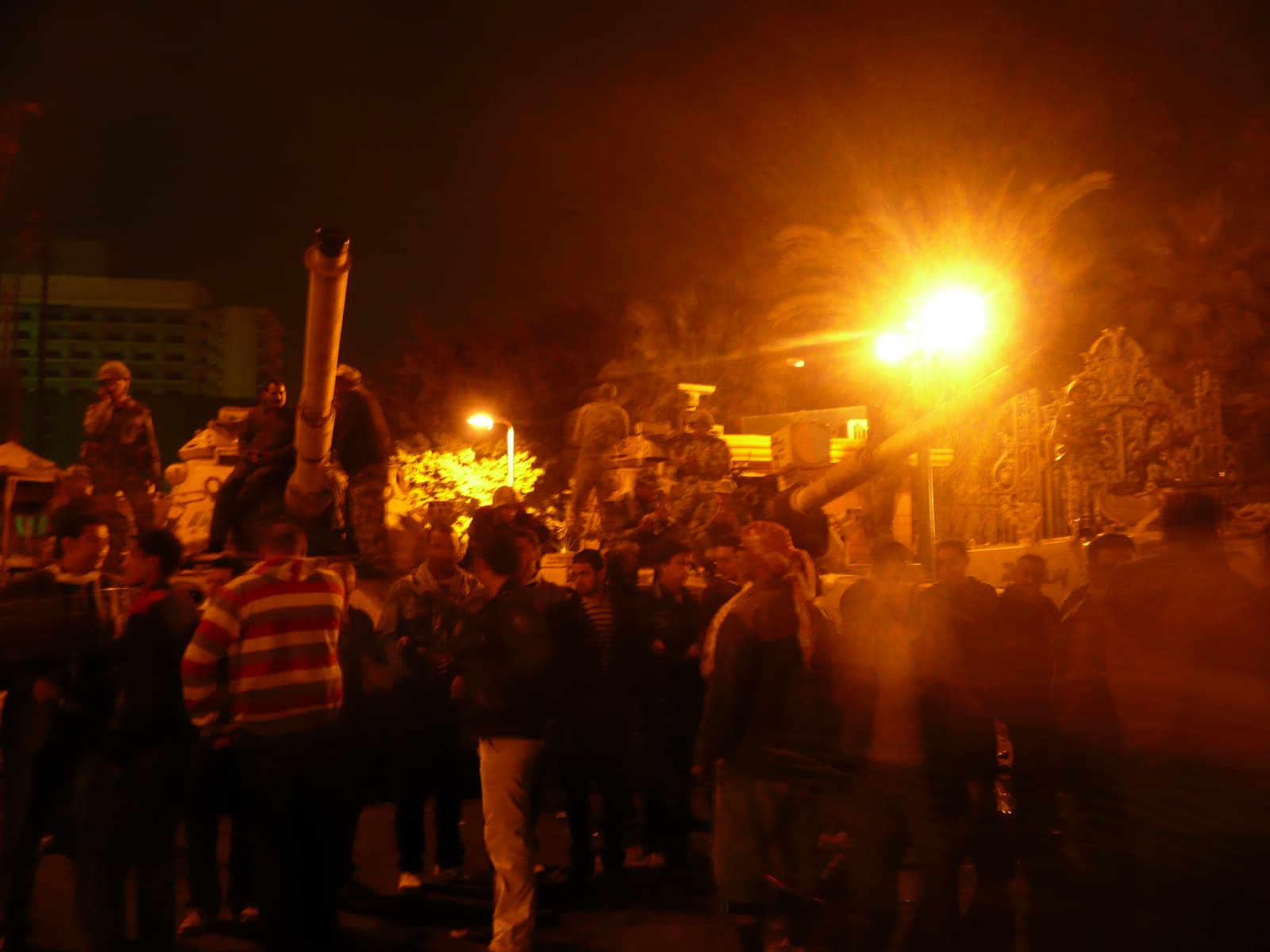
Se også
Egypt at 100 (Red Pepper, February 28, 2022). “Heba Taha explores the drastic political transformations of the Egyptian state 100 years since independence.”
Tidslinjen 26. juli 1956 om Suez-krisen (Socialistisk Bibliotek)


















